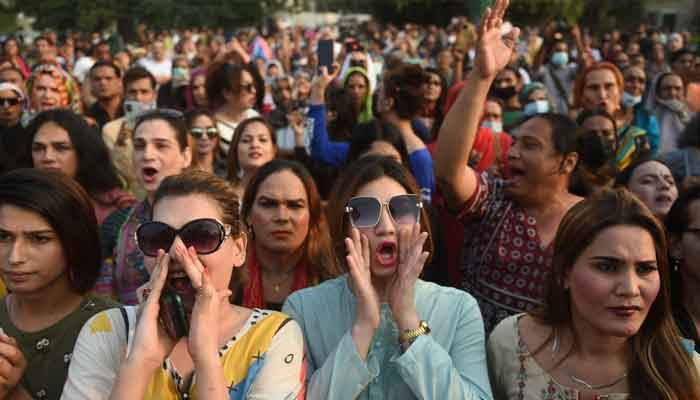SHRC calls for empowering transgender community through economic justice
The Sindh Human Rights Commission (SHRC) organised a landmark consultation focused on economic justice for the transgender community in Sindh.
This initiative aimed to hear directly from transgender individuals about their lived experiences, challenges, and policy recommendations. Iqbal Ahmed Detho, chairperson of the SHRC, reaffirmed the SHRC’s dedication to inclusive dialogue and protection of human rights. He provided an overview of the ommission’s past initiatives for the transgender community, including suo motu action on the CNIC legal identity issue and affirmative efforts through social welfare programs aimed at integrating transgender persons into society.
Sheeraz Shoukat Rajper, MPA and SHRC board member, emphasized that while legal protections for transgender individuals exist, there is a lack of effective coordination between the Government of Sindh and stakeholders. He stressed the importance of ensuring that allocated funds for transgender welfare are fully utilized and not allowed to lapse.
On the CNIC issue, he clarified that the medical certificate requirement stems from efforts to prevent the registration of foreigners, though he acknowledged the concern this poses for the community. He also noted that creating separate hospital wards is not a comprehensive solution, and deeper reforms are necessary.
Human Rights and Business Framework
Barrister Rida Tahir, ,ember for business and human rights at SHRC, presented an overview of the Business and Human Rights Framework in Sindh, with a particular focus on transgender rights. She highlighted key legal instruments, including the Transgender Persons (Protection of Rights) Act 2018, the Protection Against Harassment of Women at the Workplace Act (2010, amended in 2022), and laws promoting equal remuneration and opportunity.
She noted that this consultation marked the first official meeting on Business and Human Rights within the SHRC, showcasing the commission’s expanding commitment to inclusive rights-based discourse.
Barrister Tahir also shared relevant data from national censuses, revealing that the transgender population increased from 10,418 (6th Census) to 20,331 (7th Census). During the session, transgender participants shared persistent challenges in obtaining CNICs due to the medical certification requirement, which continues to act as a barrier to legal identity and access to services. Concerns were also raised about the lack of dedicated healthcare services, including the need for inclusive hospital facilities, and the inadequate implementation of job quotas for transgender persons. The participants stressed that while laws exist, practical access remains limited.
The lack of sensitivity among government officials was also noted, and calls were made for specialized training to promote respectful and inclusive service delivery. The importance of involving the Social Welfare Department was highlighted, especially in ensuring the proper utilization of funds earmarked for transgender stipends.
A representative from Nadra affirmed the authority's willingness to assist the community in addressing CNIC-related issues. Participants also recommended that vocational training institutes such as STEVTA offer skill development programs tailored to the transgender community. Many attendees shared that they avoid public hospitals due to discriminatory behaviour and instead rely on costly private healthcare options, underscoring the need for inclusive public services.
This consultation marks a critical step toward building trust, amplifying marginalized voices, and embedding equity into institutional frameworks. The SHRC reaffirms its commitment to continuous engagement with the transgender community and to advocating inclusive policies that ensure economic justice, dignity, and full participation for all.
-
 Timothee Chalamet Admits To Being Inspired By Matthew McConaughey's Performance In 'Interstellar'
Timothee Chalamet Admits To Being Inspired By Matthew McConaughey's Performance In 'Interstellar' -
 'Determined' Savannah Guthrie Plans To Honour Her Mother Nancy With Major Move: 'It's Going To Be Emotional'
'Determined' Savannah Guthrie Plans To Honour Her Mother Nancy With Major Move: 'It's Going To Be Emotional' -
 Train's Pat Monahan Blows The Lid On 'emotional' Tale Attached To Hit Song 'Drops Of Jupiter'
Train's Pat Monahan Blows The Lid On 'emotional' Tale Attached To Hit Song 'Drops Of Jupiter' -
 Kurt Russell Spills The Beans On His Plans For Milestone Birthday This Year: 'Looking Forward To It'
Kurt Russell Spills The Beans On His Plans For Milestone Birthday This Year: 'Looking Forward To It' -
 PayPal Data Breach Exposed Sensitive User Data For Six-month Period; What You Need To Know
PayPal Data Breach Exposed Sensitive User Data For Six-month Period; What You Need To Know -
 Prince William Receives First Heartbreaking News After Andrew Arrest
Prince William Receives First Heartbreaking News After Andrew Arrest -
 11-year-old Allegedly Kills Father Over Confiscated Nintendo Switch
11-year-old Allegedly Kills Father Over Confiscated Nintendo Switch -
 Jacob Elordi Talks About Filming Steamy Scenes With Margot Robbie In 'Wuthering Heights'
Jacob Elordi Talks About Filming Steamy Scenes With Margot Robbie In 'Wuthering Heights' -
 Why Prince Harry Really Wants To Reconcile With King Charles, Prince William, Kate Middleton?
Why Prince Harry Really Wants To Reconcile With King Charles, Prince William, Kate Middleton? -
 'Grief Is Cruel': Kelly Osbourne Offers Glimpse Into Hidden Pain Over Rockstar Father Ozzy Death
'Grief Is Cruel': Kelly Osbourne Offers Glimpse Into Hidden Pain Over Rockstar Father Ozzy Death -
 Timothée Chalamet Reveals Rare Impact Of Not Attending Acting School On Career
Timothée Chalamet Reveals Rare Impact Of Not Attending Acting School On Career -
 Liza Minnelli Gets Candid About Her Struggles With Substance Abuse Post Death Of Mum Judy Garland
Liza Minnelli Gets Candid About Her Struggles With Substance Abuse Post Death Of Mum Judy Garland -
 'Saturday Night Live' Star Will Forte Reveals How He Feels About Returning To The Show After 2010 Exit
'Saturday Night Live' Star Will Forte Reveals How He Feels About Returning To The Show After 2010 Exit -
 Police Officer Arrested Over Alleged Assault Hours After Oath-taking
Police Officer Arrested Over Alleged Assault Hours After Oath-taking -
 Maxwell Seeks To Block Further Release Of Epstein Files, Calls Law ‘unconstitutional’
Maxwell Seeks To Block Further Release Of Epstein Files, Calls Law ‘unconstitutional’ -
 Prince William Issues 'ultimatum' To Queen Camilla As Monarchy Is In 'delicate Phase'
Prince William Issues 'ultimatum' To Queen Camilla As Monarchy Is In 'delicate Phase'




